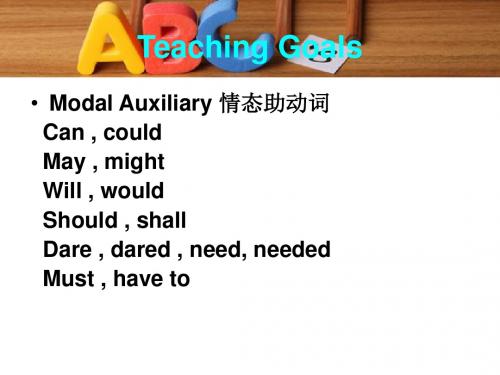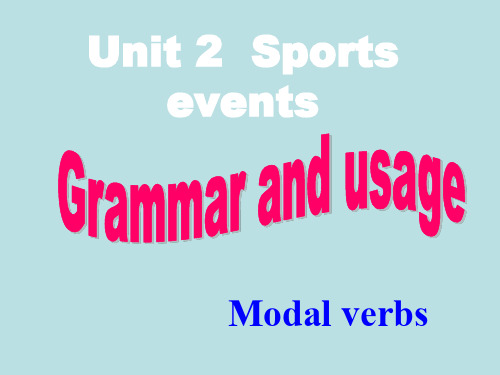高三英语情态动词复习课件
合集下载
高考语法专题复习 情态动词(共16张PPT)

Tape script(听力原文): Because there is a typhoon, the meeting at 8 o’clock is cancelled.
Answer: N__o_,_h_e_n__ee_d_n__’t_._/N__o_,_h_e_d_o_e_s_n_’_t have to
classroom now because he hasn’t finished
yet. 2.They c_a_n_’_t _b_e_r_e_a_d_in_g_ in the library now
for I saw them leave the library just now. 3.The boym_a_y__/_m__ig_h_t_b_e__w_a_t_ching(watch)
熟 读 深
years old. Lucy also keeps taking exercise every day. She says that she has表to不[得3]不do some sports because she mu表st必[4须] keep slim. “You sha表ll[告5诫] get fat soon if you don’t take exercise every day.”
One night after supper, she walked quickly in
order to go dancing at the Tomorrow Park and
she was late. On her way, she thought that the dancing must have begun[10], and the coach could have taught or shown[11] many new moves.
高三英语一轮复习情态动词课件

• 她不可能在办公室里工作,因为我刚才在剧院看到她了。 He can't/couldn't have finished so much work in so short a time.
• 他不可能在这么短的时间内完成如此多的工作。(对已经 发生的事情的推测)
can与could的用法
• could have done 本来能做/本来可以做但没做 • couldn’t have done • 本不能做/本不可以做但做了 • We could have gone there on foot and a taxi wasn't necessary at all. • 我们本来可以走着去那儿,根本没必要乘出租车。
• 有些情态动词有过去式,有些则没有
• can—could may—might
shall—should
• will—would have to—had to dare—dared
(一)can与could的用法
• (1) can的用法。 • ①表示某种能力。 • e.g.: A bird can fly. • 鸟会飞。
can do nothing but do cannot help but do
短语和句式
• can't help it 无计可施 • can't wait to do 迫不及待地做…… • cannot, could not 与比较级连用, • 表示最高级的意思
I got an A. I couldn't wait to tell it to my parents. 我得了A,迫不及待地告诉了我父母。 Please come here as early as you can. = Please come here as early as possible. 请你尽早来这里。 It couldn't be better. 没有比这更好的了。
• 他不可能在这么短的时间内完成如此多的工作。(对已经 发生的事情的推测)
can与could的用法
• could have done 本来能做/本来可以做但没做 • couldn’t have done • 本不能做/本不可以做但做了 • We could have gone there on foot and a taxi wasn't necessary at all. • 我们本来可以走着去那儿,根本没必要乘出租车。
• 有些情态动词有过去式,有些则没有
• can—could may—might
shall—should
• will—would have to—had to dare—dared
(一)can与could的用法
• (1) can的用法。 • ①表示某种能力。 • e.g.: A bird can fly. • 鸟会飞。
can do nothing but do cannot help but do
短语和句式
• can't help it 无计可施 • can't wait to do 迫不及待地做…… • cannot, could not 与比较级连用, • 表示最高级的意思
I got an A. I couldn't wait to tell it to my parents. 我得了A,迫不及待地告诉了我父母。 Please come here as early as you can. = Please come here as early as possible. 请你尽早来这里。 It couldn't be better. 没有比这更好的了。
高考英语情态动词课件(共21张PPT)

He shall get his money.
5)Should 表示说话人的惊奇、愤怒、失望等特殊情感 It’s surprising that Mary should love such a person as Jack. It’s strange that … It’s unthinkable that … I’m sorry that…
肯定疑问 Dare we run? 句
Do we dare (to) run?
否定疑问 Dare he not run? Doesn’t he dare to run ? 句
Need, needed
Need /needed
1、情态动词用于否定句,疑问句 He needn’t worry about it.
This will be the house you're looking for .
Will , would
5)would常用于虚拟条件句,表示与事实相反或不太可能实现的情况 But for your help we would have been late .
6) Would 表示过去的习惯性动作或某人的一典型动作,又使人厌烦的感 觉。 He would go swimming in summer when he was in the countryside.
3.表示请求和允许,与may同义,相当于be allowed to.常用语口语中。 You can smoke in this room. Could I borrow you dictionary?
Can , could
4.用于一些固定句型 a. Cannot ( can never) …too…怎么也不过分
如询问某种可能时,应用can。 He must know my address. (一定) He can’t know my address. (一定不) Can he know my address? (询问可能性)
5)Should 表示说话人的惊奇、愤怒、失望等特殊情感 It’s surprising that Mary should love such a person as Jack. It’s strange that … It’s unthinkable that … I’m sorry that…
肯定疑问 Dare we run? 句
Do we dare (to) run?
否定疑问 Dare he not run? Doesn’t he dare to run ? 句
Need, needed
Need /needed
1、情态动词用于否定句,疑问句 He needn’t worry about it.
This will be the house you're looking for .
Will , would
5)would常用于虚拟条件句,表示与事实相反或不太可能实现的情况 But for your help we would have been late .
6) Would 表示过去的习惯性动作或某人的一典型动作,又使人厌烦的感 觉。 He would go swimming in summer when he was in the countryside.
3.表示请求和允许,与may同义,相当于be allowed to.常用语口语中。 You can smoke in this room. Could I borrow you dictionary?
Can , could
4.用于一些固定句型 a. Cannot ( can never) …too…怎么也不过分
如询问某种可能时,应用can。 He must know my address. (一定) He can’t know my address. (一定不) Can he know my address? (询问可能性)
高考英语语法一轮复习——情态动词课件(共20张PPT)

---Yes, you can.
No, you can’t /mustn’t.
shall/ will
陈述句中,shall表达诺言; will表示决心或决定
1) Take it easy. You shall be offered a job in this company.
2) Mike will spare no effort to study.
tomorrow. It’s of great importance.
②在疑问st.”; 否定 “No, sb. needn’t.”
或“No, sb. don’t (doesn’t) have to.” *don’t have to = needn’t 没必要
5. 情态动词+have done表示对已经发生事情推测、 责怪、后悔、遗憾等。
needn’t have done 过去没有必要做某事而实际上却做了 could have done 过去本可以做某事却没做 may / might have done 过去可能已经做了某事
1. 情态动词can, could和be able to的用法
---__C______.
A. No, you need B. No, please C. No, you mustn’t D. No, you won’t
Modal verbs: general introduction
一.情态动词的语法特征
情态动词表示说话人对某一动作 或状态的态度,可以表示“可能”、 “可以”、“需要”、“必须”或“应 当”等之意。
*他不可能去了国外,因为我刚刚在他的 办公室遇见他。
He can't have gone abroad, because I met him in his office just now.
No, you can’t /mustn’t.
shall/ will
陈述句中,shall表达诺言; will表示决心或决定
1) Take it easy. You shall be offered a job in this company.
2) Mike will spare no effort to study.
tomorrow. It’s of great importance.
②在疑问st.”; 否定 “No, sb. needn’t.”
或“No, sb. don’t (doesn’t) have to.” *don’t have to = needn’t 没必要
5. 情态动词+have done表示对已经发生事情推测、 责怪、后悔、遗憾等。
needn’t have done 过去没有必要做某事而实际上却做了 could have done 过去本可以做某事却没做 may / might have done 过去可能已经做了某事
1. 情态动词can, could和be able to的用法
---__C______.
A. No, you need B. No, please C. No, you mustn’t D. No, you won’t
Modal verbs: general introduction
一.情态动词的语法特征
情态动词表示说话人对某一动作 或状态的态度,可以表示“可能”、 “可以”、“需要”、“必须”或“应 当”等之意。
*他不可能去了国外,因为我刚刚在他的 办公室遇见他。
He can't have gone abroad, because I met him in his office just now.
高考英语语一轮复习——情态动词课件(共57张PPT)

He used to / would smoke while writing.
She used to be fat.
shall
1)在疑问句中shall用于一, 三人称,表示 征求对方的意见或指示
Shall he come to see you?
What shall I do to help you? 2) 在陈述句中shall 用于二,三人称,表示
作为情态动词will 可以用于条件状语从句
would和used to
1)used to表示过去与现在或过去某时与后 来的情况有不同,而would只表过去的情况 (过去往往)。
People used to think that the earth was flat.
She would go out for a walk in the morning when she was in the country. 2)used to可表示过去习惯性的动作和经常 的状态,would只表示过去习惯的动作。
You should have come here earlier.
1.Students should respect teachers.
2.He suggested that we should act at once.
3.The boys shouldn’t be playing football. They should be at school.
---No, you __n_ee_d_n’t____.
don’t have to
will 和would
1.will 在疑问句中表示请求和建 议.would 比will 更婉转,礼貌 Will you come to my office?
She used to be fat.
shall
1)在疑问句中shall用于一, 三人称,表示 征求对方的意见或指示
Shall he come to see you?
What shall I do to help you? 2) 在陈述句中shall 用于二,三人称,表示
作为情态动词will 可以用于条件状语从句
would和used to
1)used to表示过去与现在或过去某时与后 来的情况有不同,而would只表过去的情况 (过去往往)。
People used to think that the earth was flat.
She would go out for a walk in the morning when she was in the country. 2)used to可表示过去习惯性的动作和经常 的状态,would只表示过去习惯的动作。
You should have come here earlier.
1.Students should respect teachers.
2.He suggested that we should act at once.
3.The boys shouldn’t be playing football. They should be at school.
---No, you __n_ee_d_n’t____.
don’t have to
will 和would
1.will 在疑问句中表示请求和建 议.would 比will 更婉转,礼貌 Will you come to my office?
高考英语一轮复习——情态动词七大考点课件(共37张PPT)

1.作为情态动词用,常用在否定句和疑问句中。 疑问句:Dare (need) +主语 +动词原形 否定句:主语 + daren’t (needn’t) +动词原形
I daren’t walk through the forest at night. Dare you walk through the forest at night? You needn’t return the book now. Need he go yesterday?
4. 情态动词短语的使用:
Can’t /couldn’t …… too …… Can’t /couldn’t ……enough Can’t help doing Can’t help do May/might as well do
would like/love to do… would rather do…
4. He would rather to die than to give in. He would rather die than give in.
5. You’d better to have your hair cut today. You’d better have ...
5 可兼做行为动词的情态动词:need 、 dare
2.dare,need作实义动词用,用于肯定,否定, 疑问句,有人称、时态、和数的变化,后+ to do。 He dares to go there by himself. He has grown up,we don’t need (to )worry about him.
3.Sth need( want, require)+ doing/ to be done The house needs cleaning/ to be cleaned The boy needs sending to the hospital at once.
I daren’t walk through the forest at night. Dare you walk through the forest at night? You needn’t return the book now. Need he go yesterday?
4. 情态动词短语的使用:
Can’t /couldn’t …… too …… Can’t /couldn’t ……enough Can’t help doing Can’t help do May/might as well do
would like/love to do… would rather do…
4. He would rather to die than to give in. He would rather die than give in.
5. You’d better to have your hair cut today. You’d better have ...
5 可兼做行为动词的情态动词:need 、 dare
2.dare,need作实义动词用,用于肯定,否定, 疑问句,有人称、时态、和数的变化,后+ to do。 He dares to go there by himself. He has grown up,we don’t need (to )worry about him.
3.Sth need( want, require)+ doing/ to be done The house needs cleaning/ to be cleaned The boy needs sending to the hospital at once.
高中英语情态动词各种用法课件(共47张PPT)

一 、表能力 :表现在的或一般的能力:表示 现在的或一般的能力用can 或 be able to. 一 般的能力是指你无论什么时候做什么事情就 能做到的能力。表示现在的能力或一般的能 力时,can比be able to 更普遍。
A computer can’t think for itself; it must be told what to do. (表示一般的能力)
This can’t / couldn’t be done by him. (表示不 相信)
He could be on his way home now. (could 不 如 may / might常用)
Can this be done by him? (表示一种疑惑、 惊讶)
(3)would, could, should, might 并不一定 与过去的时间有关,而是表示可能性弱于他 们相应的现在形式。如:
do something / succeeded in doing sth.
The fire spread through the hotel very
quickly but everyone was able to get out. (过去有能力并成功地做了某事)
(3) could have + 过去分词,表示过去有 能力做但未做。
表示对过去已经发生的行为进行推测,意为 “想必 / 准是/ 一定做了某事
It must have rained last night, for the road was quite muddy.
The lights were out. They must have been asleep.
2. can have done
- 1、下载文档前请自行甄别文档内容的完整性,平台不提供额外的编辑、内容补充、找答案等附加服务。
- 2、"仅部分预览"的文档,不可在线预览部分如存在完整性等问题,可反馈申请退款(可完整预览的文档不适用该条件!)。
- 3、如文档侵犯您的权益,请联系客服反馈,我们会尽快为您处理(人工客服工作时间:9:00-18:30)。
II 情态动词在一般疑问句的问与答
1. Need I…? Yes, you must. No, you needn’t. 2. Must I…? Yes, you must. No, you needn’t . (No, you don’t have to./ No, you haven’t got to.) 3. May I…? Yes, you may. (=Yes, certainly / of course.) No, you may not. (No, you can’t / mustn’t.)
5. may (might) have + done sth, can (could) have + done sth 表示过去,推测过去时间里可能 发生的事情。 Philip may have been hurt seriously in the car accident. He might have gone to Nanjing with Professor Wang last week, but he was ill.
4. need 情态动词的用法 用在否定,疑问或条件从句中。 You needn’t go and tell her about it. Tom has told her. 附:need 实义动词的用法: (1) 作“需要”讲,后接名词或代词。 I badly need a haircut now. (2) 作“需要”讲,后接动名词的主动式或动词不定 式的被动式。 The little child needs to be operated on at once. (3) 作“需要”讲,后接复合结构。 Doctor, I need my bad tooth out. (4) 作“需要”讲,后接不定式。 Tomorrow is Sunday. You don’t need to arrive early.
3. dare 情态动词的用法: I dare not do that, or I’ll be beaten by my father. 附:dare 实义动词的用法: 肯定句中,常用 dare to do sth. 结构;否定句中,常 用 …not dare (to) do sth.结构(否定句中的不定式符 号 to 可以省略)。 It is time that we should dare to have a try. 试译:①你敢穿过那片森林吗? Dare you go through the woods? ②他不敢向爸爸要零花钱。 He dare not ask his father for pocket money. He dared not ask his father for pocket money. He didn’t dare (to) ask his father for pocket money. He doesn’t dare (to) ask his father for pocket money.
8. can’t / couldn’t have done 表示对过去发生的 事情的否定推测。 They can’t have gone skiing last winter, for there was little snow in the mountain. —There were five people in the car, but they managed to take me as well. —It couldn’t have been a pleasant journey.
V will和shall, dare和need的用法
1. shall 的用法: (1) 在疑问句中,用于第一、第三人称,用来征询对方意见或 请求指示。 Mr. Smith wants to see you, manager. Shall he wait outside or in the office? (2) 用在第二、第三人称之后表示说话人的“许诺、警告、命 令、威胁”等意愿。 You shall have the story-book as soon as I finish reading it. (3) 用在 Let’s do sth. 的反意疑问句中。 Let’s go swimming, shall we? 注意: 的反意问句, OK? 注意:Let’s not do sth. 的反意问句,常用 all right 或 OK? It’s raining hard. Let’s not go out, all right (OK)?
6. could have done 表示本能够做到某事,却没 有做到,所表示的是与事实相反的情况。 We could have finished the work ahead of time. 我们本来是能够提前完成工作的。 7. couldn’t have done 表示本不能够做到某事, 却做到了,所表示的是与事实相反的情况。 We couldn’t have finished the work ahead of time without your help.
IV情态动词+不定式完成式的结构和用法
1.must have done 一定做了……, 表示对过 去情况极大把握的推测。 There’s no light in the room. They must have gone to bed. 2. should / ought to have done, 表示本应该做 某事却没有做到,含有批评、责备的意思。 You should have come here a little earlier. I ought to have sent him to school.
情态动词复习
I 情态动词的语法特征
1) 情态动词不能表示正在发生或已经发生的事情, 只表示期待或估计某事的发生。 2) 情态动词 除ought 和have 外,后面只能接不带to 的定式。 3) 情态动词没有人称,数的变化,即情态动词第三 人称单数不加-s。 4) 情态动词没有非谓语形式,即没有不定式,分 词,等形式。
3.can 和be able to 1)can could 表示能力;可能 (过去时用could), 只用于现在式和过去式(could)。be able to可以用于各种时态。 They will be able to tell you the news soon. 他们很快就能告诉你消息了。 2)只用be able to a. 位于助动词后。 b. 情态动词后。 c. 表示过去某时刻动作时。 d. 用于句首表示条件。 e. 表示成功地做了某事时,只能用was/were able to, 不能 用could。 He was able to flee Europe before the war broke out. = He managed to flee Europe before the war broke out.
VI 几组词语辨析
1.must与have to must强调说话者的主观看法, have to强调客观需要,表示“不必”意要用 needn’t或don’t have to, 或haven’t got to不能用 mustn’t。 I have stayed too long. I must go. It’s getting late. I have to go now.
2. may和might 和 1)表示允许或请求;表示没有把握的推测;may 放 在句首,表示祝愿。 May God bless you! He might be at home. 注意: might 表示推测时,不表示时态。只是可能性 比may 小。 2)成语: may/might as well,后面接不带to 的不定式, 意为"不妨"。 If that is the case, we may as well try.
3. shouldn’t have done / oughtn’t to have done 表示本不应该做某事却做了某事,也含有批 评、责备的意思。 He ought not to have thrown the old clothes away. 4. needn‘t have done sth表示本没必要做某事, 却做了某事。 I dressed very warmly for the trip, but I needn't have done so. The weather was hot.
4. Shall I…? Yes, please. No, thanks. / No, you needn’t .(委婉) / No, you can’t .(反对) / No, you mustn’t. (禁止) 5. Could I…? Yes, you can. / No, you can’t. 6. Might I…? Yes, you may. / No, you may not.
III 情态动词表示“推测”的用法
1.can,may,must使用的句式: 1)肯定陈述句中:must表“肯定、必定、一定”意, may/might表“也许,或许”意。 2)否定陈述句中:can’t/couldn’t表“不可能”意, may not/might not表“也许不、可能不”意。 3)疑问句中:只能用can或could,不能用must,may 或might。 注意:表推测的could, might并不是指过去时间 并不是指过去时间, 注意:表推测的could, might并不是指过去时间, 而是表示比can, may把握性略小些的情况。 而是表示比can, may把握性略小些的情况。 把握性略小些的情况
2.对目前状态的推测: 1)must/may/might/can/could+be+表语 She must be a teacher.她肯定是老师。 She can’t/couldn’t be a doctor.她肯定不是医生。 He may not/might not be a doctor. 他可能不是医生。 2)must/may/might/can/could+一些不能用于进行时 的静态动词(如:have,exist,live,like,hate,own,belong to 等) She must have her own car, for she has a lot of money. That kind of bird may live in the valleys.
